
June 4, 2024 - The U.S. Court of Appeals for the Seventh Circuit has ruled that a man convicted of homicide but held without any meaningful appeal for 28 years must be released unless the State of Wisconsin grants him a new trial within two months.
In Pope v. Taylor, No. 23-2894 (May 6, 2024), the Seventh Circuit Court of Appeals also held that a Wisconsin Supreme Court decision turning down the man’s appeal in 2019 forfeited the deference afforded to state courts under a federal habeas corpus statute.
Abandoned by His Attorney
Robert Pope was convicted of two counts of first-degree intentional homicide in Milwaukee County Circuit Court in May 1996.
Pope then filled out a form directing his attorney, Michael Backes, to file for post-conviction relief. But Backes, who was later reprimanded for abandoning four other criminal defendants, didn’t file a post-conviction for Pope.
Missed Deadline
In September 1997, Pope filed a pro se motion in the Wisconsin Court of Appeals, seeking to extend the deadline for filing notice of intent to file for post-conviction relief.
 Jeff M. Brown , Willamette Univ. School of Law 1997, is a legal writer for the State Bar of Wisconsin, Madison. He can be reached by
email or by phone at (608) 250-6126.
Jeff M. Brown , Willamette Univ. School of Law 1997, is a legal writer for the State Bar of Wisconsin, Madison. He can be reached by
email or by phone at (608) 250-6126.
The Court of Appeals ruled that Pope had forfeited his appellate rights because he had failed to file for post-conviction relief within the 20-day deadline.
Pope then sought relief from the circuit court. The circuit court denied Pope, based on the Court of Appeals ruling.
Appeal Rights Reinstated
Finally, in 2016, the State acknowledged that Pope was entitled to appeal his conviction. The circuit court ordered that Pope’s direct appeal deadlines be reinstated.
However, Pope’s ability to appeal was crippled by his lack of a trial transcript. Under Wisconsin law, court reporters are only required to keep copies of trial transcripts for 10 years, and Pope neglected to order a transcript in 1996.
In 1997, Pope asked for a trial transcript but the Court of Appeals denied his request, and Pope couldn’t afford to pay for a copy of the transcript.
New Trial, But No Transcript
In 2017, the Milwaukee County Circuit Court held that Pope was entitled to a new trial, given the lack of a trial transcript and the impossibility of reconstructing the transcript.
But the Court of Appeals reversed the circuit court’s ruling, and the Wisconsin Supreme Court upheld the Court of Appeals’ decision in 2019.
In a 4-3 decision, the Supreme Court held that the lack of a transcript entitled a defendant to a new trial only if the defendant has made a “facially valid claim of arguably prejudicial error” which could only be substantiated by a transcript.
Pope filed a petition for habeas corpus under 28 U.S.C. section 2254 in the U.S. District Court for the Eastern District of Wisconsin.
The district court ordered the State to release Pope unless it began, within six months, the process of re-trying Pope.
The State appealed.
‘Multiple Burdens’
Judge Frank Easterbrook began his opinion for a three-judge panel by explaining why Pope was unable to meet the standard established by the Supreme Court in 2019: he had no legal training, and he barely remembered the details of his trial.
“It is now almost 28 years since Pope was sentenced to life in prison, and he has yet to enjoy an appeal,” Easterbrook wrote.
Judge Easterbrook concluded that the State had violated Pope’s constitutional rights to counsel and to an appeal equivalent to that available to a wealthier litigant – one who, for instance, could have paid for a copy of his trial transcript in 1997.
Easterbrook noted that under U.S. Supreme Court caselaw, a state court must set aside the conviction of a defendant whose constitutional rights it has violated, unless it finds beyond a reasonable doubt that the violation was harmless.
“Yet Wisconsin’s judiciary has never found that the errors were harmless beyond a reasonable doubt,” Judge Easterbrook wrote.
“Instead, it has placed multiple burdens on Pope – a burden to take over the tasks that his faithless lawyer should have performed and a burden to show arguable issues that a transcript might illuminate.”
State’s Position a ‘Fallacy’
Judge Easterbrook concluded that the Wisconsin court system had forfeited the benefit of deference due it under 28 U.S.C. section 2254 because it had mistakenly assumed that the appeal that Pope was allowed in 2016 was a complete remedy for any constitutional violations.
“Wisconsin insists that offering a criminal defendant an appeal, 20 years late, without a transcript, is a constitutionally adequate substitute for a timely appeal with a lawyer and a transcript,” Easterbrook wrote.
“To state the position is to show the fallacy,” Judge Easterbrook wrote. “No sane person would accept one in lieu of the other.”
‘A Travesty of Justice’
Easterbrook noted that the Seventh Circuit has held that a state judiciary’s four-year delay in resolving the appeal of a criminal defendant authorized a federal court to take up an application for collateral review.
“Almost eight years have passed since Pope’s right to an appeal was re-instated, but that entitlement was illusory,” Judge Easterbrook wrote. “Wisconsin’s treatment of Pope is a travesty of justice.”
The Seventh Circuit ruled that the State must release Pope on bail unless it begins a re-trial within two months.
If the trial doesn’t begin within three months, the Seventh Circuit ruled, the State must vacate Pope’s conviction and release him without condition.
